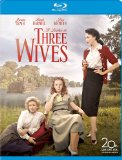| Reviews & Columns |
|
Reviews DVD TV on DVD Blu-ray 4K UHD International DVDs In Theaters Reviews by Studio Video Games Features Collector Series DVDs Easter Egg Database Interviews DVD Talk Radio Feature Articles Columns Anime Talk DVD Savant Horror DVDs The M.O.D. Squad Art House HD Talk Silent DVD
|
DVD Talk Forum |
|
|
| Resources |
|
DVD Price Search Customer Service #'s RCE Info Links |
|
Columns
|
|
|
Letter to Three Wives: 65th Anniversary, A
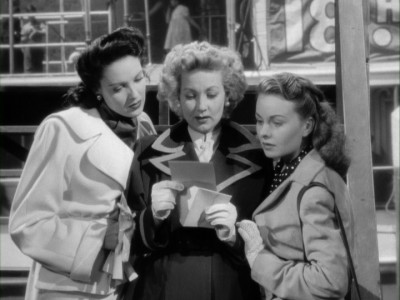
Please Note: The images used here are taken from the 2004 DVD release of A Letter to Three Wives, not the Blu-ray edition under review.
When it came to forever associating his name with a kind of sparkling, witty, genuinely smart and classy peak of Golden-Age Hollywood filmmaking, writer/director Joseph L. Mankiewicz paved the way for his 1950 masterpiece All About Eve with 1949's lesser-known but just about equally laudable and gratifying A Letter to Three Wives. Like Eve, it's a layered narrative with layered characters, cleverly structured and packed with vivid performances and the kind of dialogue for which Mankiewicz (a veteran of the stage and author of most of his own screenplays) duly earned his status as the Oscar Wilde of midcentury movie-speak. Most likely, it sits in the shadow of its more famous successor simply because it lacks the ferocious backstage rivalry and quotable cattiness (though not entirely on the second count). Its central relationship(s) are, in fact, almost the reverse of Eve's predominant sabotage and backstabbing: The dynamic contrasts between the three upper-middle-class suburban ladies at its center, all fast and loyal friends despite their marked differences, anticipates the affectionate, addictive, identification-inviting sparks that flew years later when the all-female multiple protagonists of The Golden Girls and Sex and the City developed their oft-prickly but enduring bonds, the recognizable, quasi-archetypical personality types complementing and sometimes irritably contrasting in a way that fascinates while it reminds us of how we all define what "type" we are by where our personalities converge with and part from those of the people we know best.
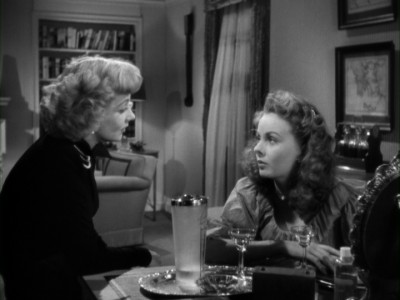
So, maybe you're more of a sincere, self-conscious naif like transplanted farm girl Deborah (Jeanne Crain, the good sister in Leave Her to Heaven), anxious after marrying a wealthy man she met while serving in the Army, to fit in with his classy set after he brings her home from WWII. Or perhaps you more closely resemble her savvy, practically-minded protectress, Rita (Ann Sothern), a career woman who's as aware that the radio soaps she writes are low-grade nonsense as she is that you can't live on high artistic principles, especially if you want the pretty suburban house, car, and kids. Or maybe you relate a little more easily to Lora Mae (Linda Darnell), a tough cookie from the wrong side of the tracks whose practical-minded, well-advised (considering her circumstances) gold-digging and manipulations threaten to snuff out her tender core. Whichever of the wives' backgrounds and personalities hits closest to home for any given viewer, by the end, Mankiewicz's prismatic view of these multifaceted, differently strong and vulnerable ladies has you on all of their sides, equally understanding and protective of all of them as they face their shared menace: that letter referred to in the title.
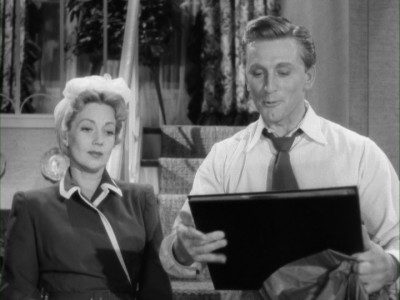
Another way in which A Letter to Three Wives presages All About Eve is in its clever, charmingly convincing flashback construction: Mankiewicz, the technically creative riches of golden-studio-era Hollywood at his disposal, isn't lacking an eye or sense of cinematic space and rhythm in deploying the restrained, realism-tending Fox craftspeople, with seamless cutting by J. Watson Webb Jr., a melancholy-tinged score by Alfred Newman (along with some bizarre, quasi-avant-garde sound effects that work little wonders in conjuring a sort of dreaminess into the flashback-laden atmosphere), and crisply elegant lighting and compositions by cinematographer Arthur C. Miller (How Green Was My Valley, A Royal Scandal) making for a mostly invisible but graceful style in the sounds and images. But it's in his writing and in his light but surprisingly solid touch with a beautifully assembled cast (not just the leads but also, for example, Kirk Douglas as the most dashing and memorable of the husbands, and Thelma Ritter adding her usual put-upon, exasperated working-class spice to the decidedly upwardly-mobile proceedings) that Mankiewicz's most luminous gifts shine. His biggest conceit for the film -- an ongoing voice-over narration by a character we never actually see, the wives' sometime bachelor-girl gal-pal Addie Ross (voiced by Celeste Holm), who has written a form letter, cc'd to each of the three women, informing them that she's stolen one of their husbands, who won't be there when one of them gets home, and who tauntingly marshals for us the triptych of episodes in which each of the women is introduced in turn, their personalities and backgrounds and marriages limned in turn -- is so clever and effective that it was stolen wholesale by Desperate Housewives creator Marc Cherry and durably milked for years. And the joy he takes in his actors, their characters and performances (he was notoriously picky when it came to the un-showy but all-important casting phase, when a director makes some of his or her least glorified but most crucial decisions) is palpable, a testament to the aura and energy only dedicated, comfortable, disciplined but encouraged actors can provide.
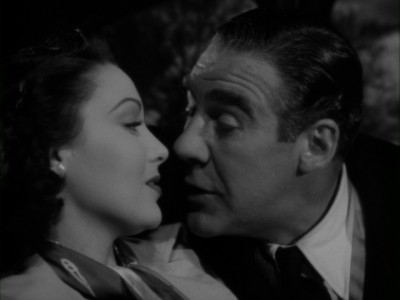
A Letter to Three Wives was adapted by Mankiewicz (who got an Oscar for his trouble, along with one for Best Director) from a serialized "novel" by John Klempner that was run in Cosmopolitan magazine, which could be taken as ironic or incongruous in light of Mankiewicz's well-educated, literary, classically-minded ideas of culture, which come out to good, not too prejudicial dramatic purpose in the tensions between Douglas's fine-art-loving high-school literature instructor and his wife Sothern's lucrative but trashy radio plays. But the gold Mankiewicz spins from the literally disposable dross of his source material is just his especially deep, brilliant understanding of his medium at work: He knows that the movies present new, near-utopian possibilities, where what might be only so much breathless, prosaic plot-compounding when laid out in mere words can be miraculously translated into a language in which the story and characters come to rich life, full of layered insight and fleet-footed intersectings of sophisticated comedy with resonant dramatic engagement. Suddenly, those distinctions between "high" and "low," however important or not one might believe them to be, appear to melt away for a while; in the movies, a non-literary art (a script, even one as well-honed as Mankiewicz's, is only a blueprint), an artist's mind can seem to transcend them, so that a fine aesthetic/narrative achievement and delicious intoxicating entertainment are complementary, not at all mutually exclusive. At least at one glorious time, in a film like A Letter to Three Wives, a worldly connoisseur of the lively arts like Joe Mankiewicz could work in the most popular, commercial medium in the world, and he could easily, enchantingly have it both ways, leaving us helplessly seduced by cosmopolitan intelligence coming at us from one side and effortless, dazzling comic tale-spinning from the other.
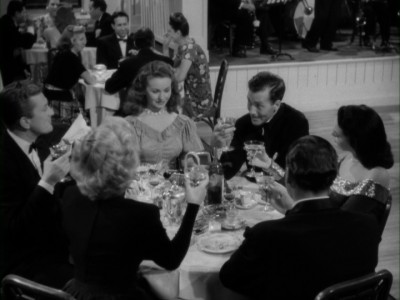
Video:
A Letter to Three Wives as it appears in high-def (at its correct aspect ratio of 1.33:1) is quite good. The contrasts and variegations of light in Arthur C. Miller's black-and-white cinematography are very well-preserved, with almost nothing in the way of flicker, wear, or decay one might expect from an older film. The textured/grained, celluloid qualities of the image are kept mostly whole and healthy, too, with perhaps only an occasional instance of going too heavy on the digital smoothing.
Sound:The DTS-HD Master Audio 1.0 sound preserves the film's mono sound very well; everything is clear, but the vintage character of the sound is retained, indicating a judicious job of cleaning without altering when it comes to the audio. All sounds are solid and full, with no imbalance or distortion heard at any point.
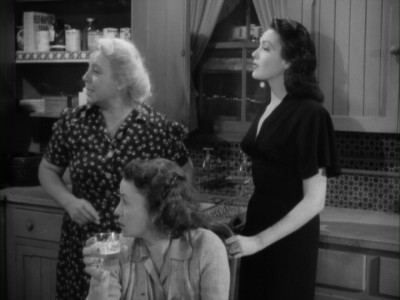
All of the extras from Fox's 2005 DVD edition (save for an interesting but unnecessary restoration demonstration) have been grandfathered in for this Blu-ray release, including:
--Feature audio commentary with Mankiewicz's son, Christopher Mankiewicz; Mankiewicz biographer Kenneth Geist; and biographer/film scholar Cheryl Lower, who together offer loads of insights into the meaning, value, and context of the film, as well as Mankiewicz's purview as a storyteller and his aesthetic signature(s) (Geist and Lower), with the Mankiewicz offspring adding a more personal/anecdotal take on the film's maker and its production. Well worth a listen.
--"Linda Darnell: Hollywood's Fallen Angel," (45 min.), a 1999 episode of A&E's Biography centered on the actress who plays Lora Mae, A Letter to Three Wives's hardbitten would-be gold-digger with a heart. This is a typically presented episode (fairly trite and simplistic, a little sensationalistic and gloating in the tabloid manner) but nonetheless informative thumbnail of Darnell's life and career, both of which were marked by turbulent ups and downs, alcoholism, depression, and ultimately ended too soon by a freak accident when she was 41.
--A one-minute Fox Movietone News short covering the 1950 Oscars ceremony that culminated in Mankiewicz's dual writer/director win for A Letter to Three Wives.
--The film's theatrical trailer, with further teasing, taunting narration by its never-seen narrator, Addie Ross (voice of Celeste Holm).
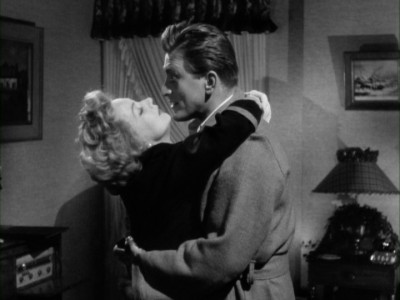
As unprepossessing and fluently plainspoken in its invisible, artisan-level Hollywood classicism as it is sparkling with smart, wised-up verve and fun in its dialogue, structuring, and characterizations, Joseph L. Mankiewicz's A Letter to Three Wives is something that has been copied many times (especially on television) but never quite matched -- the necessary cementing, after his masterpiece All About Eve, of Mankiewicz's modest but supple genius for anyone appraising his filmography in retrospect, or visiting it for the first time. So skillfully does he spin gold, as writer and director, from the throwaway magazine-story dross the film is based upon that we can't help identifying with each of its three female protagonists and their stories -- their marriages, their backgrounds and hopes and fears as they pursue the love and/or fulfillment that marriage and/or career might or might not have to offer -- in turn, relating easily to each one's own past, personality, and sometimes surprising reasons for fearing the threat (contained within the letter of the title and hanging over the entire cleverly, episodically-structured affair) to her state-sanctioned coupledom. It's a magically durable formula, exemplified by Cukor's The Women but much perfected here, and with much kinder and deeper (but at least equally sharp) results to boot, by Mankiewicz: All of those probably idle but always intriguing "Which Sex and the City girl are you?" or "Golden Girl whose personality matches yours" or even "Which member of the Entourage do you resemble?" games we indulge in are the successors of the complementarily-different networks of characters put into play by these classic Hollywood-studio group outings. Mankiewicz articulately poses the questions, "Which of the three wives do you relate to?" with such exuberant cinematic articulation that each of his fetching, markedly distinct heroines earns our rapt attention, interest, and sympathy. But by the end, it's a trick question: It doesn't sacrifice any of its dramatic tension or level out the many sharp edges in these three ladies' personalities to do it, but A Letter to Three Wives makes a case in which all three of the women whom that troublesome letter puts on narrative trial, despite their diversity and disparities, is allowed to well and fully acquit herself, and makes their triumph ours, too. Highly Recommended.
|
| Popular Reviews |
| Sponsored Links |
|
|
| Sponsored Links |
|
|
| Release List | Reviews | Shop | Newsletter | Forum | DVD Giveaways | Blu-Ray | Advertise |
|
Copyright 2024 DVDTalk.com All Rights Reserved. Legal Info, Privacy Policy, Terms of Use,
Manage Preferences,
Your Privacy Choices | |||||||









